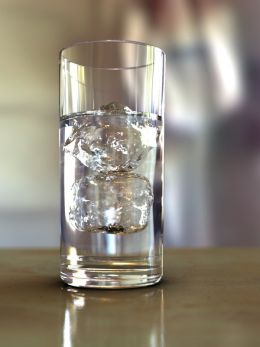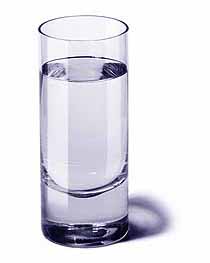| Share |  |
 | |||
The Wonders of Water
 Water is more essential to life and health than any other nutrient or substance besides oxygen. The body can go without food for weeks but no more than a few days without water. It is the prime energizer that nourishes every cell and organ in the body. Water is present in all body tissue and is the main component of all body fluids. When you consider your body is two-thirds water in weight, it stands to reason that one of the most important steps you can take on the road to greater health is to ensure it has a constant and consistent supply of pure water.
Water is more essential to life and health than any other nutrient or substance besides oxygen. The body can go without food for weeks but no more than a few days without water. It is the prime energizer that nourishes every cell and organ in the body. Water is present in all body tissue and is the main component of all body fluids. When you consider your body is two-thirds water in weight, it stands to reason that one of the most important steps you can take on the road to greater health is to ensure it has a constant and consistent supply of pure water.Vital to All Life Processes
We know from scripture and science that life is in the blood. Water comprises eighty-two percent of the blood that carries the life-sustaining nutrients, chemical messengers and hormones to the cells as well as waste products from the cell. Insufficient water intake directly affects the water volume of cells and has a direct bearing on how efficiently these vital processes occur. Cells die without the energy to maintain the critical balance between fluid inside and outside of the cells, which is essential to every function of the body.
Water is key to digestive system functions as saliva, bile, stomach acid, pancreatic juices and the mucous lining of the stomach, which all consist mostly of water. The cleansing of our intestinal tract and efficient removal of wastes and toxins from our bodies through the organs of elimination depend largely upon water. Adequate water intake keeps the kidneys flushed and able to do their job of cleansing the blood. If kidneys become overloaded with toxins and cease to function properly, toxins can build up and circulate throughout the bloodstream. Water regulates body temperature and keeps the tissues of the body moist. It protects the spinal cord as well as lubricates and cushions joints . These are just a few examples of the numerous functions of water in the body.
Could Dehydration Be the Problem?
A majority of people in this country function with low-level dehydration and suffer a variety of preventable ailments as a result. In his book titled The Seven Pillars of Health , Dr. Don Colbert states in his chapter on water, which he considers to be the number one pillar of health, "I treat every patient I see in my practice first with water. Most of my patients get better when they simply drink as much water as their body is asking for. Drinking sufficient amounts of the right kind of water will also do more to improve your health than anything else you can do !" He likens treating ailments with medications without getting to the root of what is causing the symptoms in the first place to shutting off the body's "signal for help." It would be the same as removing the fuse of the "check engine" warning light of a car without knowing the cause. Pain and symptoms of illness are often just the body signaling its need for water and there is a clear relationship between chronic dehydration and disease. Water serves as a natural medication for a variety of health conditions.
Help for Common and Serious Conditions

Drinking more water can help many common and serious conditions such as high blood pressure and high cholesterol. When fluid amounts in the intravascular space decrease with lack of water, heart rate increases causing blood vessels to constrict in order to maintain blood pressure. However, this coping mechanism will fail if dehydration persists. Blood then becomes thicker and loses volume, making the heart work harder and the blood circulation less efficient. Water can actually thin the blood, helping the heart to pump more efficiently and lowering blood pressure.
Blood flow is also blocked by having too much cholesterol resulting in a thickening and hardening of artery walls, slowing it down even further and reducing the amount of oxygen to the heart with potentially serious consequences. Cholesterol is a necessary fat-like substance utilized in the formation and regulation of cell membranes in addition to the production of hormones and bile acids that digest fat. Poor hydration causes excess cholesterol to be produced by the liver in its attempt to keep vein and artery walls from becoming brittle and hardened. Drinking water, especially before meals, can actually flush out some of this excess cholesterol, return the veins and arteries to their proper condition and halt the overproduction of cholesterol by the liver.
Relief from Aches and Pains
Another way drinking water can do wonders in your body is by alleviating much arthritis, neck and back pain caused by water deficiency in the affected joint cartilages. When fluid-filled discs become dehydrated and wear out, they are more prone to herniation and degenerative disk disease. Cartilage also consists of mostly water and needs good hydration to provide the smooth surface so joints can glide easily during movement with minimum frictional force. Sufficient water intake improves back conditions as the water volume stored in the disc core of spinal vertebral joints supports 75% of the weight of the upper body. Water helps to lubricate, insulate, protect and give flexibility to the muscles, ligaments and joints of our body. Many types of headaches are caused by dehydration and can be relieved simply by drinking six to eight ounces of room temperature water per hour until the headache subsides. Stomach pain, including heartburn and acid reflux can also be helped with water. Ample water must be present to produce the bicarbonate solution needed to neutralize acidic chyme so it can pass from the stomach into the small intestine before it damages the stomach lining or reenters the esophagus.
Improve your smarts and looks!
The brain is comprised of a greater percentage of water than any other organ of the body and spends a vast amount of energy. Drinking more water boosts mental performance and memory but brain processes can slow down and nerve transmissions diminish with as little as two percent dehydration. Water keeps skin supple, giving it a softer, smoother and younger appearance by preventing the dryness and loss of elasticity that causes sagging and wrinkles. Losing weight also benefits appearance and water plays a key role in weight management by regulating appetite and metabolizing stored fat. People often confuse the sense of thirst with the urge to eat. Drinking water before meals creates a sense of fullness, helping to reduce appetite. Ample water helps the kidneys function so their workload is not dumped on the liver whose job it is to metabolize fat into usable energy. When the liver is unable to adequately metabolize fat, it will accumulate as fatty cells and tissues in the body. Another way dehydration contributes to inefficient metabolism is causing a drop in body temperature, signaling the body to store fat in order to raise it. In addition, when the body is dehydrated, it perceives a threat to its survival and secretes a hormone that causes water retention. Consuming more water causes the body to release that water stored while in "survival mode."

Don't Wait to Get Thirsty
Many times people don't think to drink water until they experience thirst or a dry mouth. However, the sense of thirst, which diminishes with age, is a poor indicator of the need for fluid considering a state of mild dehydration already exists when thirst or a dry mouth is experienced. Dehydration occurs when the amount of water taken in is less than the amount that leaves the body. Water is routinely lost primarily by the processes of breathing, sweating, urinating and waste elimination, and a significant amount of water is needed to replace this loss. Staying sufficiently hydrated is one of the easiest and least expensive ways to stay in good health.
If you would like to learn more in-depth information about the relationship of chronic dehydration and degenerative disease and how common pains and symptoms can be alleviated through the use of water, I would encourage you to read Your Body's Many Cries for Water, by Dr. Fereydoon Batmanghelidj. Dr. Batmanghelidj is a medical doctor who devoted most of his medical career to extensive clinical and scientific research on the phenomenon of pain and water metabolism in the body, discovering that much pain and sickness in the body are simply signals of thirst.
In part two of this topic in our next edition, we will look at how much water to drink, when to drink, the importance of water quality, what kind of water to drink, the different methods of purifying water, the effects of chlorine, the truth about bottled water and other information concerning water that can affect your health.
Copyright © 2008-2015 Lucinda Bedogne, CNHP, CNC
Reader Comments...
| 2009-02-12 22:46:40 "If you just read even parts of this, and then think about Jesus proclaiming himself to be the "living water"... how fitting that is. There are so many parallels in the characteristics. :)" - Candace |
| 2009-02-11 15:05:31 "Lucinda, Thanks for the article. It was great. I have been convicted to take in more water and this helps motivate me to be more diligent in doing that." - Charlotte |
Post Your Comment...
|
|
||||||||||||


